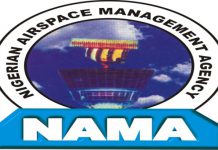Ime Akpan
The director general Nigerian Maritime Administration and Safety Agency, (NIMASA), Dr Bashir Jamoh said Nigeria ratified no fewer than six international maritime conventions between 2022 and 2023.
Jamoh said in a statement that the ratification would enable proper governance of the country’s maritime space
He also said the agency had in the last three years doubled the country’s momentum for a viable blue economy that seeks to harness maritime potentials for economic sustainability and growth.
“Nigeria has ratified Hong Kong International Convention for the Safe and Environmentally Sound Recycling of Ships 2009; the International Convention on Standard of Training, Certification and Watch keeping for Fishing Vessel Personnel1995; Protocol Relating to Intervention on the High Seas in Cases of Oil Pollution Casualties (Intervention Protocol) 1973 among other conventions.”
“The ratified conventions spelled out the proper mode of governance for various areas such as standards of training, certification and watch keeping for the fishing sector, pollution management, and carriage of passenger luggage by sea.
“Its implementation drive has earned Nigeria some accolades and a lot couldn’t have been achieved without reliable legal backing either as legislations or international conventions which Nigeria acceded to,” he said.
He also said within three years the Agency concluded the review of 49 Regulations made under the Merchant Shipping Act, 2007. Laws in this category specifically sought to protect the interests of indigenous professionals and investors in the maritime industry with first-choice opportunity preferences.
He further said the agency had bridged operational gaps between the maritime sector and other areas while fostering inter-agency collaboration with Nigerian government-owned organisations.
Jimoh stressed that NIMASA also succeeded in executing some memorandum of understanding between the it gency and the Nigerian Meteorological Agency (NiMet), Nigerian Institute of Transport Technology (NITT), and the National Oil Spill Detection and Response Agency (NOSDRA) among others.
Other are MoUs are on the recognition of certificate of competency (CoC) and training of seafarers between Nigeria and 16 countries.
He said the partnerships aim at expanding opportunities for international-level job placement for holders of Nigeria CoC while also causing Nigerian skilled maritime manpower deployment in addressing the global challenge of a declined number of seafarers.
Besides, Jamoh said NIMASA achieved the automation of the registration process of shipping company/Agents resulting in Certificates being embedded with QR codes for authentication.
“This has successfully eliminated the back-and-forth incidents of alleged fake certificates in the past and has enthroned a greater level of integrity and accountability in the certification process.
“The agency’s deliberate drive to educate and strengthen judicial officers on how best to handle admiralty cases was not left behind in the period under review. NIMASA successfully hosted the Annual Nigerian Admiralty Law Colloquium in collaboration with the Nigeria Institute of Advanced Legal Studies (NIALS) and the National Judicial Institute (NJI) for the years 2021, 2022, and 2023,” he added.
On anti-piracy, he said NIMASA championed the implementation of the Suppression of Piracy and Maritime Offences (SPOMO) Act 2019 which has enhanced safer and secured trading routes through the Gulf of Guinea region and ensured proper prosecution of a sizeable number of cases.
“This landmark SPOMO Act by Nigeria is presently being studied by other maritime administrations owing to its huge success in fighting piracy with a rich legal framework that is marked with successes since implementation began.”
“Beyond the shores of Nigeria, notable global maritime personalities like Kitack Lim, the secretary of the International Maritime Organisation (IMO), and Dr. Paul Adalikwu, secretary general of the Maritime Organisation of West and Central Africa (MOWCA) have recommended the SPOMO Act model to other African countries.
“All these achievements under the leadership of Dr. Jamoh and his team show an Agency focused on the use of the instrumentality of the Law to enhance the values Nigerian maritime industry adds to the nation’s economy,” he added.
























































